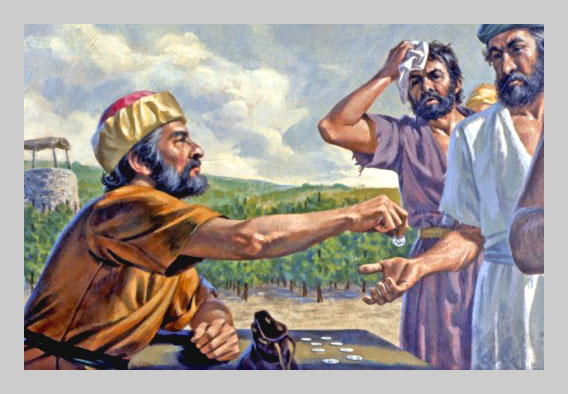 Previously, I wrote this same parable from the viewpoint of one of the laborers chosen in the last hour. This reflection will look at the key points that would have attracted the attention of the first century listener.
Previously, I wrote this same parable from the viewpoint of one of the laborers chosen in the last hour. This reflection will look at the key points that would have attracted the attention of the first century listener.
The beginning of the parable likened the kingdom of heaven to a landowner. We have no problem seeing the landowner in the parable as God, and rightly so. What a wonderful characterization of a loving, benevolent, merciful God.
The religious establishment who heard this parable spoken by Jesus would not have gotten this clear image. Those who owned land during the time of Jesus were the Sadducee priests or the Romans. The Roman’s had little interest in what Jesus said as long as he didn’t stir up trouble. The Sadducee’s, along with the Pharisee’s and scribes, who were already unified in their attempts to dishonor Jesus, would have heard this parable similarly.
In the opening statement, the kingdom of heaven is like a landowner, Jesus reiterated the belief that the priests had a direct connection to heaven. This would have had priests pricking their ears to listen, and maybe letting down their guard a bit.
The second part of the sentence where the landowner himself went to select workers would have left the religious leaders confused. Landowners turned the operation of their farms over to managers. To be involved in the menial task of hiring workers would threaten the honor of any landowner. Honor, or how their peers judged them, was the highest social value. The priests and other religious leaders would start to see the landowner in the parable as foolish to threaten his social status in this way.
Laborers would have gathered outside the city gates in a designated spot well known to both workers and managers. Jesus purposely and metaphorically misplaces the workers to put them inside the city, in the very heart of the marketplace. Day laborers had the lowest social status, while priests were near the top, only under kings and rulers. I expect in the metaphorical language of this parable, that the laborers left after the first pick were handicapped or defective in some way and would have no social status—they were outsiders.
Jesus’ landowner grew in his foolishness when in the next sentence, after agreeing with the laborers, the laborers have control of the wage negotiations. The Sadducees would have scoffed at this inept landowner who relinquished his power to laborers.
Most managers would have taken all the workers they needed early in the morning so that they would work the maximum hours. Any good manager would know the exact number of workers he needed and would have taken no more than necessary. Jesus’ landowner was different and grew more disorganized, scattered and foolish with his poor management skills when h e returned four more times to secure workers. Taking workers for just the last hour was beyond foolish, it was stupid. Jesus’ landowner did not measure up to priestly landowners.
e returned four more times to secure workers. Taking workers for just the last hour was beyond foolish, it was stupid. Jesus’ landowner did not measure up to priestly landowners.
It was also no mistake that the manager appears, only to call the laborers for their pay. It hinted that Jesus knew the social standards and played into the next scene where Jesus turned the social order upside down. The common practice was to address those of the highest status first. Paying the last workers first broke this honor code. I expect, when the priests heard that the ones who worked only a hour were paid first and given the same wage as those who had worked all day, were so angered that they shook their fists and dismissed Jesus as the ultimate fool.
~ ~ ~
Compare the ethics of this parable with present day management practices, what differences do you see? What is the normal response when a coworker gets a promotion or a pay raise and over another that seems more worthy? It is very human for the ego to become a vice, like the priests in this story who missed the point. Take some time to discern your own ego. Does it lean toward vise or virtue? What steps can be taken to move the ego forward on the virtue scale? God’s mercy is paramount in this story. He tried five times to save workers, how much more will God do for you? The early listeners saw God as a fool and missed the point of mercy that He gives to the late workers without consideration of their worthiness and at the same time was fair and just with the first workers He chose. Meditate on this image of the kingdom of heaven and then go out and dare to look foolish like this landowner.